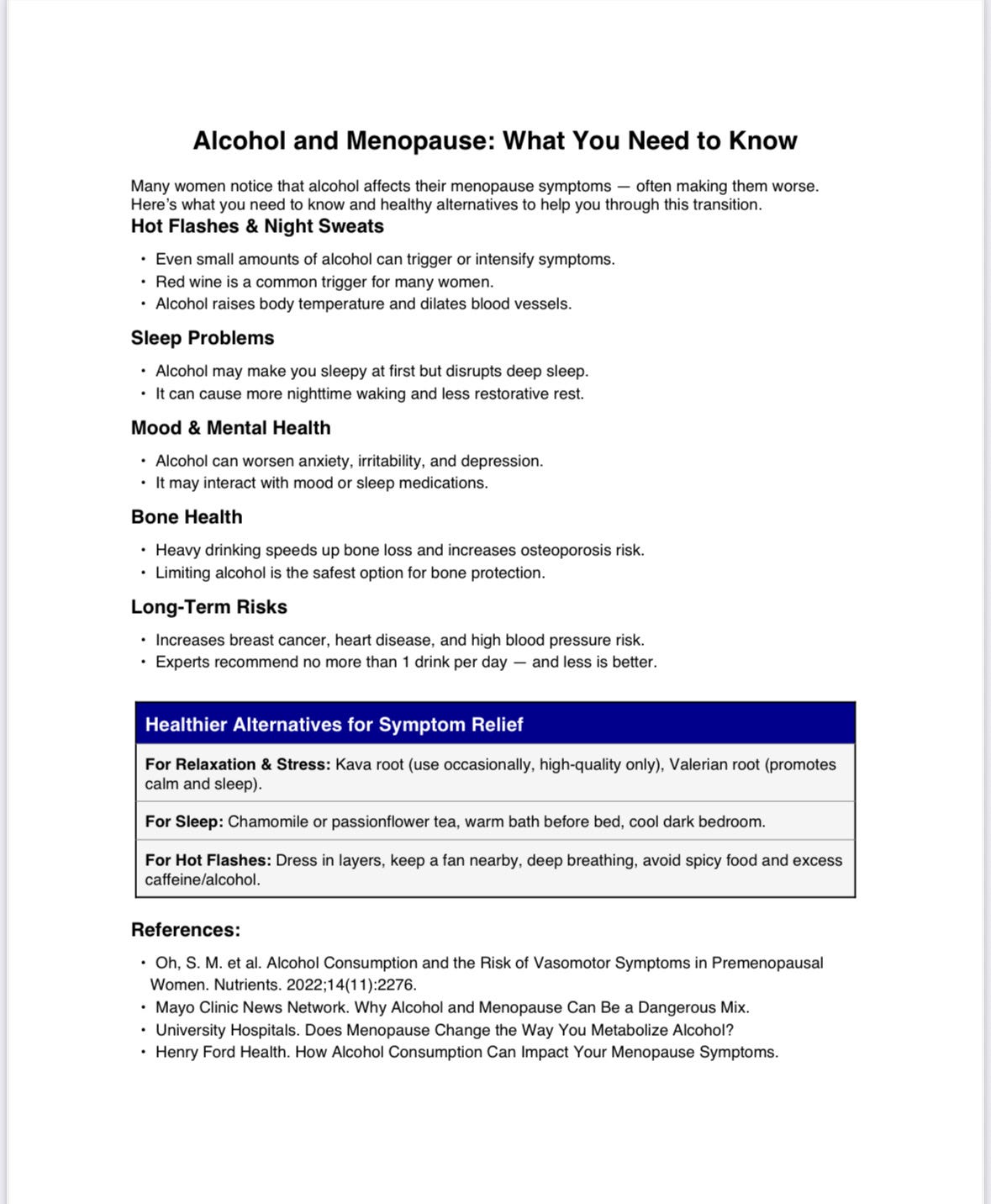Alcohol and Menopause: What You Need to Know
Many women notice that alcohol affects their menopause symptoms — sometimes in surprising ways. While everyone’s body responds differently, research shows that alcohol can make hot flashes, night sweats, mood changes, and sleep problems worse for many women.
Here’s what’s going on and what you can do about it.
1. Alcohol and Hot Flashes / Night Sweats
Even small amounts can make symptoms worse. Studies show that drinking alcohol, especially in moderate to high amounts, can trigger more frequent or intense hot flashes and night sweats.
Red wine may be a common culprit. Some women notice it brings on symptoms faster than other drinks.
Why? Alcohol may raise body temperature, dilate blood vessels, and change hormone balance — all of which can make hot flashes stronger.
2. Sleep Problems
Alcohol may make you sleepy at first, but it can disrupt deep sleep and cause more night waking.
Poor sleep can make other menopause symptoms — like mood swings and brain fog — even worse.
3. Mood and Mental Health
Alcohol is a depressant. It can increase feelings of sadness, anxiety, and irritability, especially during menopause when hormone changes are already affecting mood.
It can also interact with some medications used for depression, anxiety, or sleep.
4. Bone Health
After menopause, bone density naturally drops because of lower estrogen levels.
Heavy drinking can speed up bone loss and raise the risk of osteoporosis.
Moderate alcohol may not harm bone health for everyone, but the safest choice for bone protection is to limit drinking.
(See our article on Boron and Borax)
5. Long-Term Risks
Alcohol raises the risk of breast cancer, heart disease, and high blood pressure — all of which are already concerns for postmenopausal women.
The safest daily limit is no more than 1 drink per day — and many experts recommend less.
Healthier Ways to Cope with Menopause Symptoms
If you’re using alcohol to “take the edge off” after a stressful day or to relax before bed, there are gentler alternatives that may help:
For Relaxation & Stress
Kava root – Traditionally used for relaxation and to reduce anxiety. Choose only high-quality, reputable brands to avoid liver toxicity risks, and use occasionally.
Valerian root – Can promote calmness and better sleep. Works best when taken regularly rather than only as needed.
Wild Yam - enhances the endocrine system and provides balance when the ovulation ceases.
(Always check with your healthcare provider before starting new supplements, especially if you take prescription medications.)
For Sleep
Herbal teas like chamomile or passionflower
A warm bath before bed
Keeping your bedroom cool and dark
Avoiding screens an hour before sleep
For Hot Flashes & Night Sweats
Dress in light layers so you can adjust quickly when you feel a flash coming on
Keep a fan nearby, even at night
Try deep, slow breathing at the start of a flash
Limit caffeine, spicy food, and — yes — alcohol
Bottom Line
Alcohol affects menopause symptoms for many women, often making them worse. You don’t have to give it up completely if you enjoy it — but paying attention to your body’s reactions, keeping intake low, and finding healthier ways to relax can make this transition much smoother.
References:
Oh, S. M. et al. Alcohol Consumption and the Risk of Vasomotor Symptoms in Premenopausal Women. Nutrients. 2022;14(11):2276. Link
Mayo Clinic News Network. Why Alcohol and Menopause Can Be a Dangerous Mix. Link
University Hospitals. Does Menopause Change the Way You Metabolize Alcohol? Link
Henry Ford Health. How Alcohol Consumption Can Impact Your Menopause Symptoms. Link


